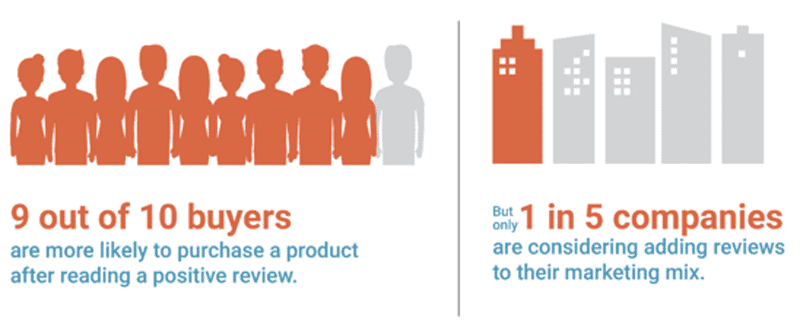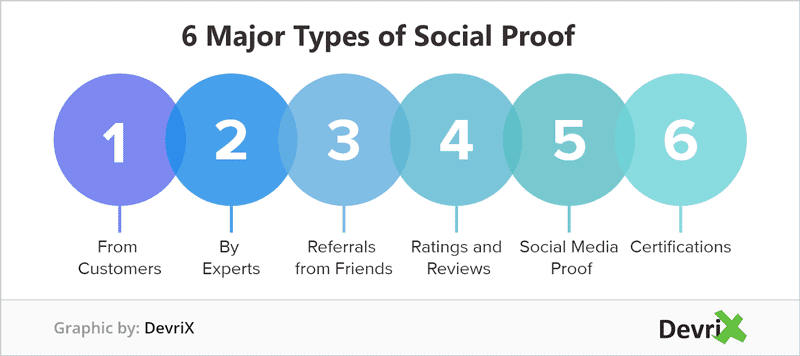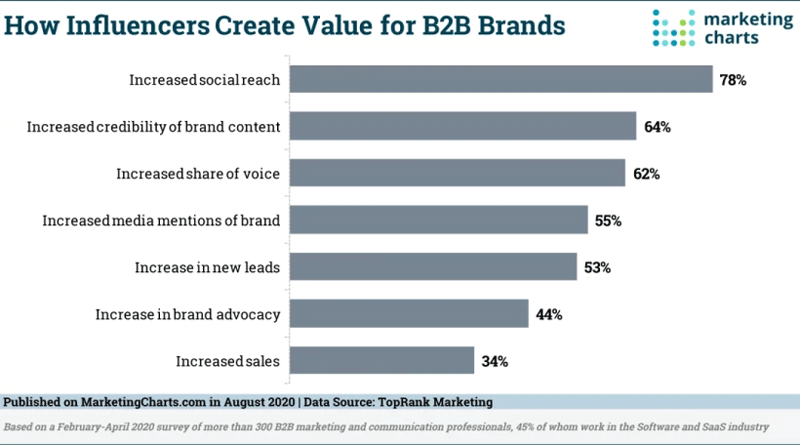In the eyes of most B2B customers, advertising and marketing have long since lost their role as credible and reliable consultants. Moreover, contemporary forms of decision making are stepping into the spotlight. Social Proof is such a method which B2B providers now consider increasingly more important.
There are several reasons why buyers in B2B choose a specific product or service. If it meets a need and is therefore the undisputed leader in the market, the decision is easy to understand.
If there is competition among suppliers, different characteristics and their individual weighting can influence a decision as well. Apart from conditions and prices, it is difficult, especially in B2B, to reliably compare offers without excessive effort and thus make decisions. Relying on recommendations from the social environment when making purchasing decisions has always been the norm in B2C. But how does in work in B2B?
What is Social Proof in B2B?
Social Proof is a collective term for ratings, success stories, reviews and any kind of ratings and proof that your customer or prospect provides, who knows and uses your product or brand. Many decision-makers go through rating platforms before making a purchase and see what competitors recommend or use.
Therefore, for many businesses, recommendation marketing is an important element of their sales strategy. Over the past decades, the forms of social interaction have changed, primarily due to the internet. This has also changed the possibilities of incorporating the individual experiences of users of a product or a service into their own decision-making.
With Social Proof, interested parties primarily rely on independent information they can find online about products and providers. Conversely, this has a significant influence on their purchase decision.

Source: www.g2.com
How Does Social Proof in B2B Work in Practice?
If you’re interested in a product or a service, there are different possibilities to draw information from.
The characteristics, quality and suitability of the product or service should be questioned according to individual needs. A free trial to test it yourself is not always possible and often involves effort and costs. Advice from the provider is rarely objective.
Our Tip: Claim your free trial or a free trial month for a product in order to see how it works and if that's what you're looking for.
Decision-makers in B2B therefore often look for independent information, provided by specialist media. When this information is not available to aid in the decision-making process, interested parties are increasingly using various forms of Social Proof. You can use Social Proof as reports of experience to gain practical insights into how the product really works.
What Types of Social Proof Are There?
Social Proof can be found in various forms, primarily online. You may know these types:
- Customer ratings on provider sites or platforms (trust symbols)
- (B2B) influencers (testimonials) presenting and rating the product/service
- Case Studies/Success Stories
- Likes, shares and followers on social media
Evaluations can be found both for specific products or services and for their providers in general. A rating can be given as a grading on one hand, but also by awarding stars or by individual reviews on the other. Often both forms of evaluation are also combined. In the case of a grading, an average value is usually determined from all the given ratings.
How Do Customers Benefit from Social Proof in B2B?
All forms of independent examination of a product or service can influence a purchase decision. For example, even the basic existence of evaluations is an initial safeguard for interested parties against dubious offers.
Reviews on independent platforms can also provide you with concrete warnings of dubious providers or indicate problems that are increasingly occurring. Above all, Social Proof is a valuable addition to product advertising and manufacturer specifications. Offers are evaluated from the user's point of view and thus, beyond sober features, strengths and weaknesses are presented in practical application. This can apply to a product or service itself as well as to the collaboration with its provider.

Source: www.devrix.com
How Can You Actively Use Social Proof?
Social Proof can be created without giving the evaluated provider the ability to influence it. Social media in particular is a source of information that is difficult to control.
However, there are certainly forms of Social Proof that are actively used by companies and can be influenced at least to a limited extent.
As already mentioned, reviews by influencers and evaluations by experts in specialist media can often be considered Social Proof as well. Companies can thus, for example, integrate positive reviews on certain review platforms (such as G2, Capterra and others in the SaaS area) on their landing pages, social media or other channels.
Public Relations and Influencer Marketing try to actively shape these formats in order to place their own company and its offer according to the corporate strategy.
Case studies and user reports are also popular ways to simulate an independent evaluation within the framework of a content strategy. Furthermore, companies have the possibility to allow their customers to evaluate their own work and to use evaluations for their own marketing.
Reviews, ratings as well as likes and comments from social media can be published on their website and used via other marketing and advertising formats.

Source: www.marketingcharts.com
What Are the Pros and Cons of Social Proof in B2B?
For companies in B2B, Social Proof is one way to win customers in the short term. On the other hand, the strategic use of diverse formats can help building a long-term image.
At the same time, however, Social Proof also bears a risk that should not be underestimated. Wherever ratings are actually given by independent users, their content can be negative, too, of course. Sometimes, reviews are even used to discredit an unpopular company.
That’s why Social Proof comes with indispensable effort for companies – even if it is not actively used.
Relevant online formats that could contain information about someone’s company must therefore be closely monitored. This is the only way to ensure that attention is not drawn to developments that could have a negative impact.
Only those responsible within the company who become aware of negative Social Proofs at an early stage can plan and implement measures to counteract them adequately. It should not be a blanket attempt to suppress negative expressions of opinion. Checking and questioning evaluations always offers the chance to understand justified criticism and to work on the permanent elimination of its causes.
Social Proof in B2B and Artificial Intelligence
Companies need technologies to adequately address the phenomenon of Social Proof. This is the only way for companies to monitor the flood of information available online and filter it with regard to their own company. In times of big data, manual research no longer makes it possible to seamlessly monitor all relevant sources, including those that the company may not even be aware of.
Artificial intelligence, based on machine learning, is suitable for automating many tasks to a large extent. Suitable systems search the Internet based on relevant key terms and thus provide relevant information that one could easily overlook otherwise.
Conclusion: Social Proof in B2B Works!
Social Proof is a new term for an old phenomenon: People prefer to orient their actions and decisions to their social environment. With the Internet, this social circle and thus the influence of Social Proof has increased significantly.
Anyone who wants to get a picture of a company and its products and services today does not just use information from the company itself. As a rule, a customer also relies on the opinion of others, which seems independent and therefore neutral.
Social Proof is both an opportunity and a risk for companies. When integrated into a communication strategy, the image of a company can be shaped positively. Social Proof is also of underestimated importance during the entire customer journey and as a support during the sales process – positive evaluations can be actively used to give (potential) customers a good feeling and bring them to a conclusion.
At the same time, companies are called upon to keep a permanent eye on the corporate image created by social proofing and to act as fast as possible in order to counteract the threat of image damage.
